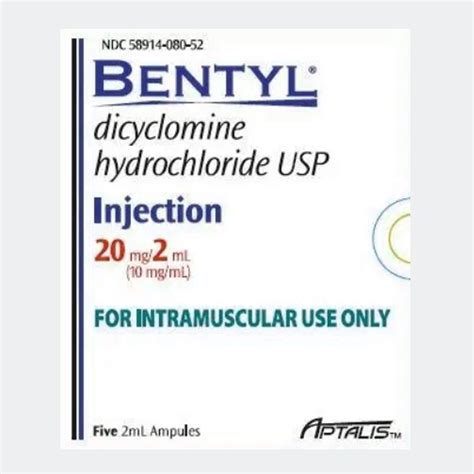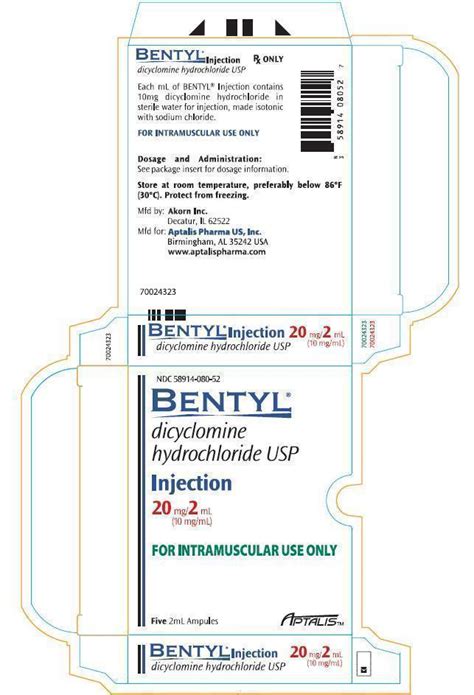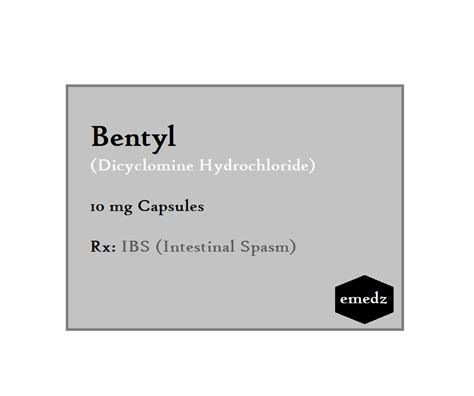Intro
Discover what Bentyl is, a medication for irritable bowel syndrome (IBS) treatment, offering relief from symptoms like abdominal pain, cramps, and diarrhea, using dicyclomine as its active ingredient.
Bentyl, also known as dicyclomine, is a medication that has been widely used for the treatment of various gastrointestinal disorders. It is an anticholinergic agent that works by relaxing the muscles in the stomach and intestines, thereby reducing spasms and cramps. Bentyl has been prescribed for conditions such as irritable bowel syndrome (IBS), functional bowel disorders, and other gastrointestinal issues. The medication is available in various forms, including capsules, tablets, and syrup, and is usually taken orally.
The importance of understanding Bentyl and its effects cannot be overstated, as it has been a staple in the treatment of gastrointestinal disorders for many years. With the rise of new medications and treatments, it is essential to revisit the benefits and drawbacks of Bentyl, as well as its potential interactions and side effects. In this article, we will delve into the world of Bentyl, exploring its history, mechanism of action, benefits, and potential risks. Whether you are a healthcare professional or an individual seeking information on gastrointestinal health, this article aims to provide a comprehensive overview of Bentyl and its role in managing gastrointestinal disorders.
Bentyl has been used for decades to treat a range of gastrointestinal conditions, from mild stomach upset to more severe disorders like IBS. Its effectiveness in reducing symptoms such as abdominal pain, cramping, and diarrhea has made it a popular choice among healthcare providers. However, as with any medication, Bentyl is not without its potential side effects and interactions. It is crucial to understand the benefits and risks associated with Bentyl, as well as its proper usage and dosage, to ensure safe and effective treatment.

How Bentyl Works
Bentyl works by blocking the action of a neurotransmitter called acetylcholine, which is responsible for stimulating muscle contractions in the gastrointestinal tract. By reducing the activity of acetylcholine, Bentyl helps to relax the muscles in the stomach and intestines, thereby reducing spasms and cramps. This mechanism of action makes Bentyl an effective treatment for conditions characterized by muscle spasms and cramping, such as IBS and functional bowel disorders.The relaxation of the gastrointestinal muscles also helps to reduce the frequency and severity of abdominal pain, diarrhea, and other symptoms associated with gastrointestinal disorders. Additionally, Bentyl may help to reduce the production of stomach acid, which can contribute to symptoms such as heartburn and acid reflux. By understanding how Bentyl works, individuals can better appreciate its potential benefits and limitations in managing gastrointestinal health.

Benefits of Bentyl
The benefits of Bentyl are numerous, and its effectiveness in reducing symptoms of gastrointestinal disorders has made it a popular choice among healthcare providers. Some of the key benefits of Bentyl include:- Relief from abdominal pain and cramping
- Reduction in frequency and severity of diarrhea
- Decreased symptoms of IBS and functional bowel disorders
- Relaxation of gastrointestinal muscles, reducing spasms and cramps
- Potential reduction in stomach acid production, alleviating heartburn and acid reflux symptoms
Overall, Bentyl has been shown to be an effective treatment for a range of gastrointestinal disorders, and its benefits have been demonstrated in numerous clinical trials and studies.

Potential Side Effects and Interactions
While Bentyl is generally considered safe and effective, it is not without its potential side effects and interactions. Some common side effects of Bentyl include:- Dry mouth
- Dizziness
- Drowsiness
- Blurred vision
- Constipation
- Urinary retention
In rare cases, Bentyl may also cause more serious side effects, such as:
- Allergic reactions
- Seizures
- Hallucinations
- Confusion
It is essential to discuss any potential side effects or interactions with a healthcare provider before taking Bentyl, especially if you have a history of certain medical conditions or are taking other medications.

Proper Usage and Dosage
To ensure safe and effective treatment with Bentyl, it is crucial to follow the proper usage and dosage instructions. Bentyl is usually taken orally, and the dosage may vary depending on the individual and the condition being treated. It is essential to follow the instructions provided by a healthcare provider and to take the medication as directed.Some general guidelines for taking Bentyl include:
- Taking the medication with food to reduce stomach upset
- Avoiding driving or operating heavy machinery while taking Bentyl, as it may cause drowsiness
- Avoiding alcohol and other medications that may interact with Bentyl
- Informing a healthcare provider of any potential side effects or interactions
By following the proper usage and dosage instructions, individuals can minimize the risk of side effects and interactions and maximize the benefits of Bentyl.

Conclusion and Final Thoughts
In conclusion, Bentyl is a medication that has been widely used for the treatment of various gastrointestinal disorders. Its effectiveness in reducing symptoms such as abdominal pain, cramping, and diarrhea has made it a popular choice among healthcare providers. While Bentyl is generally considered safe and effective, it is not without its potential side effects and interactions. By understanding the benefits and risks associated with Bentyl, as well as its proper usage and dosage, individuals can make informed decisions about their treatment options.If you are considering taking Bentyl or have questions about its potential benefits and risks, it is essential to consult with a healthcare provider. They can provide personalized guidance and help you determine the best course of treatment for your specific condition.

We invite you to share your thoughts and experiences with Bentyl in the comments below. Have you taken Bentyl for a gastrointestinal condition? What were your experiences with the medication? Share your story and help others make informed decisions about their treatment options.
What is Bentyl used for?
+Bentyl is used to treat various gastrointestinal disorders, including irritable bowel syndrome (IBS), functional bowel disorders, and other conditions characterized by muscle spasms and cramping.
How does Bentyl work?
+Bentyl works by blocking the action of a neurotransmitter called acetylcholine, which is responsible for stimulating muscle contractions in the gastrointestinal tract. By reducing the activity of acetylcholine, Bentyl helps to relax the muscles in the stomach and intestines, thereby reducing spasms and cramps.
What are the potential side effects of Bentyl?
+Common side effects of Bentyl include dry mouth, dizziness, drowsiness, blurred vision, constipation, and urinary retention. In rare cases, Bentyl may also cause more serious side effects, such as allergic reactions, seizures, hallucinations, and confusion.
